MSI GT70 Review: GTX 880M Edition
by Jarred Walton on April 16, 2014 6:00 AM ESTMSI GT70 General Performance
I don’t want to dwell on the general performance of the GT70 too much, mostly because the use of a pure HDD storage solution in our test unit means it can feel very sluggish at times. I simply would not want to use a computer – desktop or laptop – that doesn’t have an SSD as the primary storage device. I’ve been “spoiled” over the past few years, and when I go back to conventional storage it can be unbearable. Basically, my usage habits have shifted thanks to SSDs, and so now I “require” one in order to function. PCMark 7 and 8 both have a storage test, and that’s as good a place to start as any:
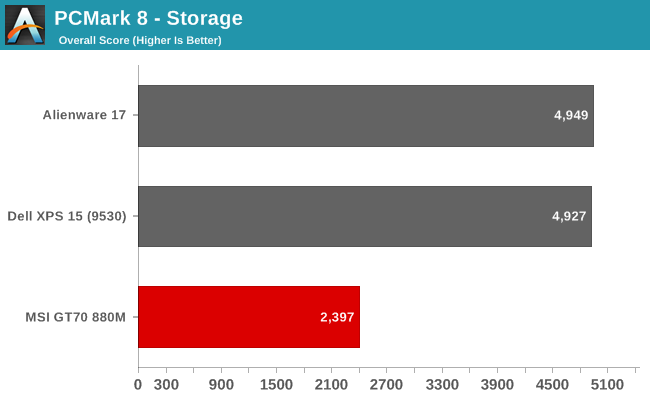
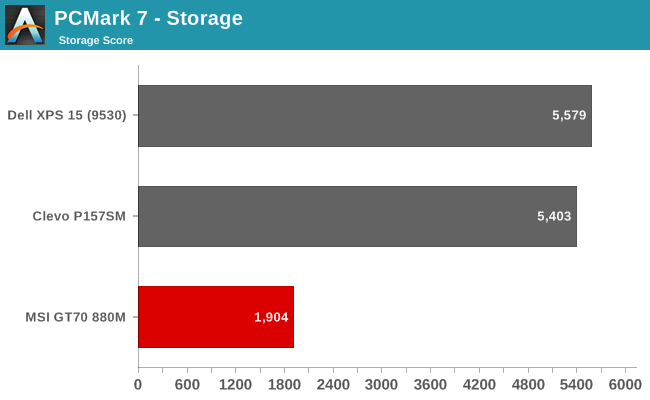
With storage being such a bottleneck, it’s pretty much pointless to discuss the other PCMark scores as all of them (except for Computation in PCMark 7) place any SSD equipped laptops ahead of the HDD-equipped GT70. The scores are in Mobile Bench, but we won't bother listing them here as they basically just reiterate the point that an SSD scores much better than an HDD in PCMark.
For CPU and GPU testing, we do have a few things we can run, but we’ve covered this ground before and the i7-4800MQ is a known quantity. It’s faster than any other mobile CPU with the exception of the i7-4900MQ and i7-4930MX, just as you’d expect. 3DMarks also illustrate what we’ve already shown with our gaming benchmarks: the GTX 880M is the fastest mobile GPU around right now.
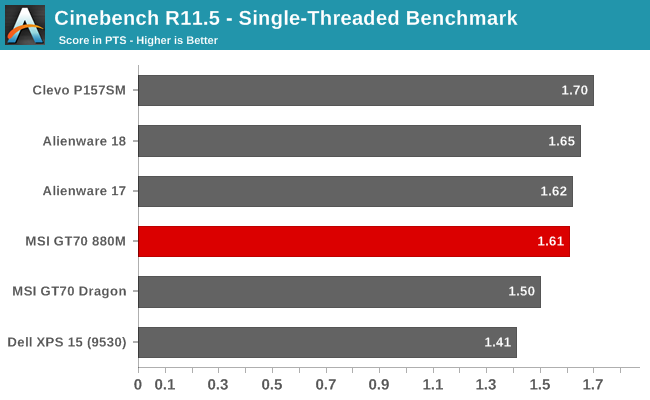
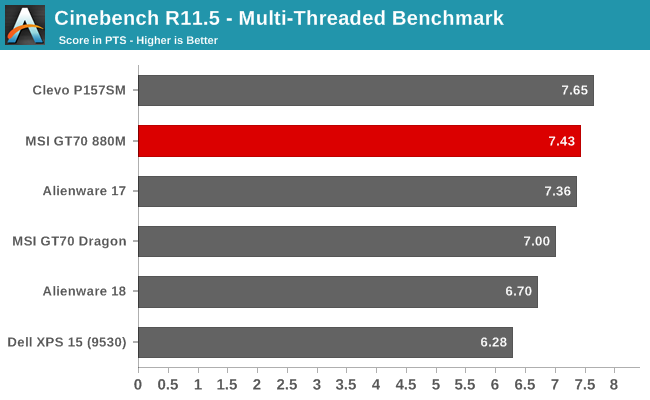
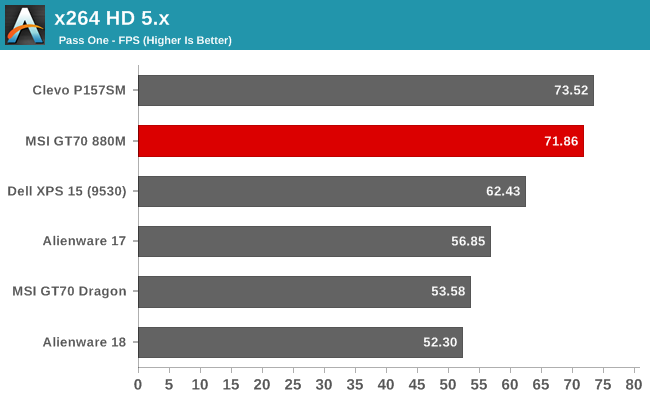
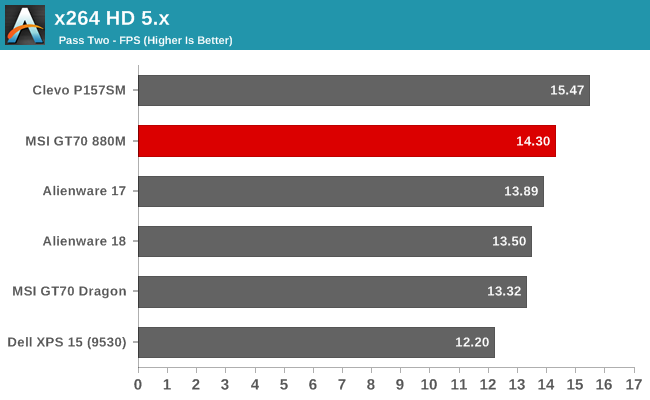
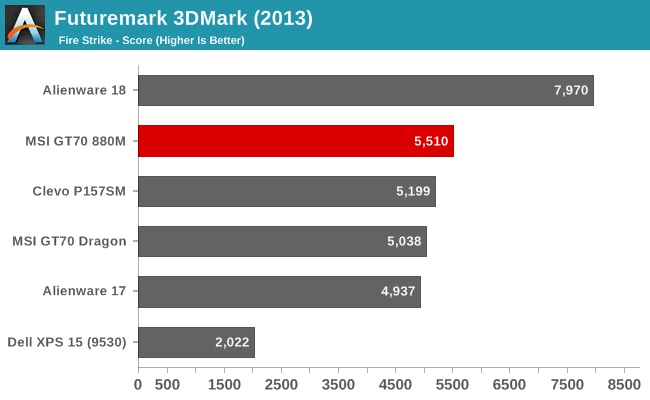
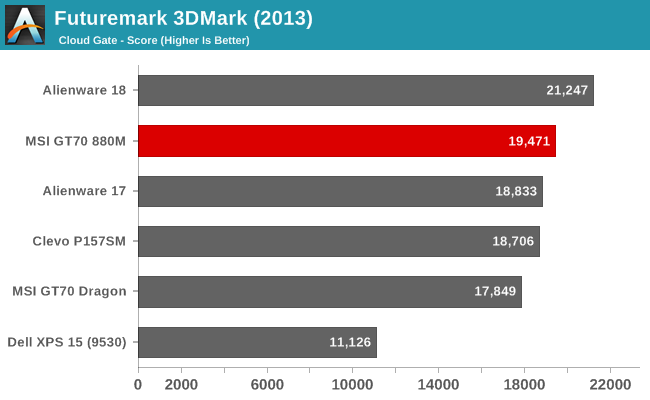
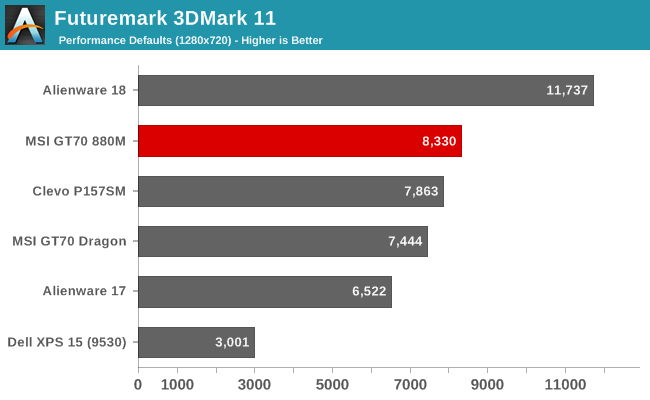










61 Comments
View All Comments
DanNeely - Thursday, April 17, 2014 - link
I have to disagree. The faster startup is nice; but it's the smoother response in ordinary use that's really sold me. Moving my OS/Apps to an SSD a few years ago did more to improve general system responsiveness than any upgrade I've made other than my initial move from a single to a dual core CPU.Notmyusualid - Monday, April 28, 2014 - link
I get chest-pains waiting on mechanical hard disks when used as a boot disk...My mother, and two of my brothers have switched over to SSDs, (at great effort by me), and they say they could never go back / transformed their machine etc. The third brother is too cheap to do so.
Now if you have the premium of time on your side, sure hitting the power button, and fetching coffee is fine.
But as a network engineer under the gun, when you have strict site-access periods, and it takes 2 weeks to get your access, and during your line-up testing, your in-house application crashes, and you've got only 30 mins before your escorted access ends, it is a God-send to be able to reboot quickly, start the database, and get your application up again, and continue to work with the other end of the link... I've known Core 2 Duo laptops, with mechanical disks, take 8 to 10 mins to do that task I just described. One minute thereabouts (honestly) with SSD. Marvelous. Surprised me too.
You can hear the deep breaths from the other end when you say 'sorry I have to reboot', but not a problem for me for a few years now...
So sorry, cannot agree there is little difference.
jak3676 - Wednesday, April 16, 2014 - link
Am I the only one that read the headline and was wondering why in the world someone would put an 8 year old 8800 GTX in a laptop?huaxshin - Wednesday, April 16, 2014 - link
@JarredWalton:From the summary, you wrote GK110 instead of GK104.
"As far as NVIDIA’s new GTX 880M, performance is pretty much what you’d expect from a slightly higher clocked GK110"
-----------------------------------------------------------------
Also did you notice that this particular model did much better than your previous GT70 review in terms of thermals? With the Dragon Edition you and me had a little discussion regarding the temperatures. You got 98C with that one while here you get 82C.
Any thoughts to why?
JarredWalton - Wednesday, April 16, 2014 - link
Possibly just a difference in components -- some 780M may run hotter (and with higher voltages) than this 880M. I pushed the system as hard as I could, just to see if it would throttle. Anyway, Dustin tested the earlier Dragon, so I don't know if he just had a poor unit or what. And I'll go edit that GK110 error. LOL -- GK110 in a notebook, I wish!shatteredx - Wednesday, April 16, 2014 - link
No 120hz display kills it for me. Does MSI even have any models with a 120hz display?Antronman - Wednesday, April 16, 2014 - link
Why would they?It's not like an 880m will reach 120fps in any games.
shatteredx - Thursday, April 17, 2014 - link
Any FPS above 60 will be smoother on a 120hz display.Also, I play many older games that hit 120 fps even on my 680M.
erple2 - Friday, April 18, 2014 - link
You need a couple of qualifiers on that. If you play with vsync on, it won't be any smoother. If you play with triple buffering, it will. Personally, I play with vsync on as I dislike tearing more than frame drops (though with proper triple buffering, you don't get the integer scaling in fps with no lag like d3d buffering offers). Though this seems like a great case for the highly proprietary g-sync..nathanddrews - Thursday, April 17, 2014 - link
Maybe not with all eye-candy maxed out, but that's not really the point of 120fps gaming.